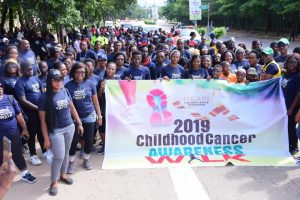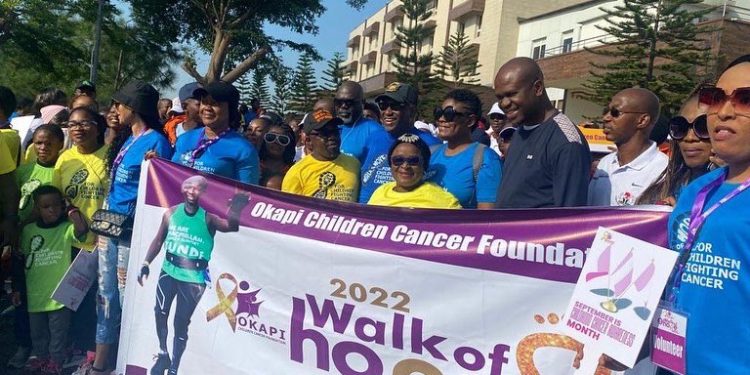Ada Emmanuel, 14, got sick at the beginning of August 2021, experiencing nausea, exhaustion, and mild headaches. She was taken to the hospital by her mother in Abuja, where she received medication and was treated for malaria.
Unfortunately, after taking several treatments and seeing no change in his health, the Doctor sent her to a teaching hospital. Then, in October 2021, she was given the bad news that she had a brain tumour called a cranial germ cell tumour. Her family has suffered dramatically due to her condition, forcing them to sell their homes to cover her medical expenses.
Emmanuel had to undergo several chemotherapeutic treatments, radiotherapy, and surgery, but her parents couldn’t pay the bills.
“Meeting the Okapi Children Cancer Foundation (OCCF), and securing funds from the organisation, with the help of God, gives my daughter another opportunity to live healthily again. This is because, doctor said if we couldn’t find the money for surgery, we would lose our child. Fortunately for us, the foundation came through and paid for the bills,” said Mrs Abigail Emmanuel, mother of the cancer survivor.
According to the National Cancer Institute, Cancer is a condition in which some of the body’s cells develop out of control and spread to other regions. As a result, radiation is frequently necessary to eliminate the aberrant cells and treat the condition.
The World Health Organisation (WHO) ranks cancer as the second most common cause of death worldwide. The health organisation also said that 41,000 cancer-related fatalities and an estimated 116,000 new instances of the disease were reported in Nigeria in 2018.
Meanwhile, Nigeria is currently estimated to have 233,911 cancer cases, with 124,815 new cases and 78,899 cancer deaths yearly. In 2021, an estimated 15,590 children and adolescents aged 0 to 19 were also diagnosed with cancer in Nigeria.
Joy Erutosa, 11, is one of the talented children in his classroom at Brilliance Kings School in Togo, where his parents are based. His sense of humour inspires people because he dances and dances to put a smile on his peers’ faces.
Unfortunately, Erutosa was diagnosed with a Wilms tumour in 2020 which devastated his mother since she found it difficult to believe the child could have cancer. His health made his parents depart Togo to Nigeria, and his sister was stopped from attending school due to a lack of funds.
Mrs. Esther Erutosa told BONEWS that when they got to Nigeria, she had lost hope that the boy might die since there was nobody to provide funds for his treatment.
“My life was useless then, and I thought we’d lose the boy since we were left with nothing before we left Togo. All our properties were being sold; the doctor said we need more funds to get him back on his feet — which we couldn’t afford.
“But God is faithful. Okapi Children Cancer Foundation raised funds for us, and we were able to get him back to normal,” a 32-year-old Erutosa said.
Lessening the problem with three approaches
Having noticed how children are dying of deadly Cancer, the Okapi Cancer Foundation (OCCF) is a nonprofit organisation was formed in 2017 by a group of friends passionate about humanitarian deeds. They were inspired by a man popularly known as “OKAPI”, who was diagnosed with cancer in 2016 and died in 2017. Since its establishment, the organisation based in Abuja has been raising funds to support children diagnosed with Cancer in Nigeria.
Before this initiative of helping children to fight cancer succeeded, there were no charities for children who had cancer; most of the available ones were mainly for breast cancer, lung and prostate. The intervention adopts a twin-track approach to engage the public with regular advocacy and awareness campaigns on childhood cancer, targeting individuals and corporate organisations. They also have a very active social media platform where infographics are sent out regularly. The approach helps people to notify the symptoms of children’s cancer and lessens its effects.
The organisation adopts three approaches; the first is collaborating with some hospitals in Nigeria where children’s cancer can be treated. They usually get weekly requests for support from childhood cancer patients, raise funds and support them.
Secondly, even though people rarely believe in childhood cancer, the organisation created a yearly cancer awareness campaign tagged “Childhood Cancer Walk in Nigeria” to strengthen the public’s knowledge about its existence. This event has, now, gained acceptance and support from the corporate and private sectors in the country’s ecosystem.
Thirdly, with a clear understanding that caregivers need encouragement and capacity building, the nonprofit usually organises yearly training for doctors on how to promote children’s cancer treatment. They believe that caregivers should be given high-priority attention so that the value and quality of care they provide to children fighting cancer at the various healthcare facilities can meet the international gold standards.
“As we all know, cancer is deadly. So the brain behind this foundation is to let people know that children’s cancer exists. We put forward approaches to also fight children’s cancer by funding patients’ treatment bills.
“The number of children who have access to treatment from Okapi Children cancer foundation (OCCF) is constantly rising and very fluid. At the last count, we have supported over 200 patients and provided support funds for their treatments.
“Moreover, we get requests for support for children fighting cancer from our partner hospitals every week,” said Dr Okonokhua Oziengbe, Head of the organisation’s management.
Oziengbe added: “Our intervention is not limited to treatments like chemo and radiotherapy; we provide psychotherapy to children fighting cancer. We also offer emotional support during children’s day in May and our annual thanksgiving party every December. The organisation also prioritises cancer awareness campaigns to educate the public.
“As a foundation, we also organise the annual childhood cancer walk that is organised yearly to draw attention to childhood cancer in Nigeria and beyond. Also, to enhance the knowledge of caregivers and the public, we organised a yearly webinar titled “Meet the Doctors” series, where we invite adolescent cancer experts to educate the public on different aspects of childhood cancer.
Stressing more on the capacity building for caregivers, he concluded that: “The first edition of the capacity building for Health care workers in childhood cancer was held in 2022 for staff of UATH at Gwagwalada Area Council of the FCT. Twenty caregivers were trained on how to prevent burnout as caregivers.”

More visionary impart
The organisation is still trying to put forward different ways that can be used to boom cancer awareness in public. This year, its vision is to shift the knowledge to secondary schools in Abuja so that young people may learn about its symptoms and precautions.
“As a way of raising awareness on childhood cancer in Nigeria, the Foundation is launching a campaign to create change agents amongst school-aged children,” said Mr Oziengbe.
Furthermore, the organisation plans to hold the first edition of “outreach” to secondary schools in FCT.
He added: “The campaign theme is Youths, the agents of change. We embark on this campaign in partnership with FCT, Secondary Education Board. The first outing is scheduled for the 16th of February 2023 as we kick off International Childhood Cancer day, marked every year on the 15th of February.”
It is not without its limitations
The organisation’s effort to create cancer-free health for children is tasking, as they rely on fundraising which is so challenging. Another challenge is the high demand support for children fighting cancer and the inadequate media coverage to hit public awareness.
“Difficulty in accessing funds to support children. We have to resort to raising funds from family, friends, volunteers and the general public. We have never received any grant. Increasing demand for support from children fighting cancer, due to dwindling economic fortunes of families.
“Lack of media coverage. The awareness campaigns we carry out are not getting support due to the huge cost of media coverage,” said the organisation’s head of management, Dr Okonokhua Oziengbe.
This story has been made possible by Nigeria Health Watch with support from the Solutions Journalism Network, a nonprofit organization dedicated to rigorous and compelling reporting about responses to social problems.

